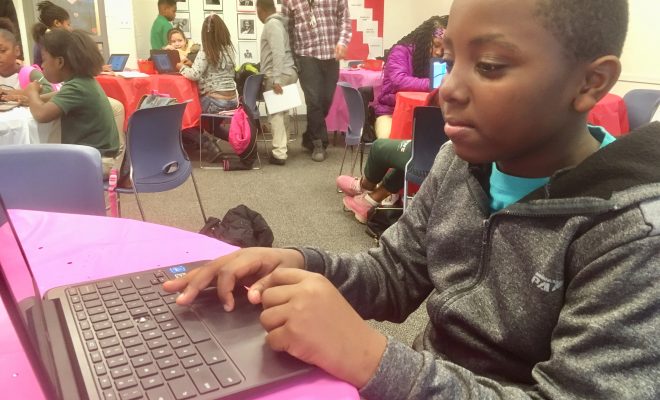5 Ways to Support Young Readers Returning to the Classroom

As a 2nd-grade teacher who has had in-person students since August, I’ve seen the challenges and opportunities of teaching reading comprehension to students adjusting to a return to classrooms.
By Cindy Davis
After months of school closures and partial closures, the vast majority of U.S. states and territories have now either ordered schools to reopen or have lifted closures to allow school districts to reopen as they see fit. Many of my teacher colleagues across the country might feel anxious about getting students acclimated to classroom learning again. As a 2nd-grade teacher in Utah who has had in-person students since August 2020, I’ve seen firsthand the challenges—and the exciting opportunities—of teaching reading comprehension to students who are back in the classroom after extended time away. Here are five ways you can learn from my experiences so you can support young readers as they return to school.
1) Be prepared for a significant learning “reset.”
I’m seeing most students across the board struggling with reading. At my school, we do progress assessments at the beginning, middle, and end of the year. I’ve come to see that missing the last part of 1st grade really set students back. The foundational skills they need to be successful in becoming good readers were full of holes.
The challenging part is that it’s hard to determine the cause. My students were out of the classroom for five months before coming back. Were they doing virtual homeschooling during this break? Were they completing all of their at-home studies? Were they getting any assistance from their parents? It was a difficult time for everyone. Parents have jobs outside the home and trying to adapt to having children learning at home was not easy for them either.
It’s difficult to know if a struggling student has special needs, or if their little brain simply went to sleep and needs time to wake up again. My advice: Don’t put too much pressure on yourself or on your students. That will only ramp up the stress that sabotages your students’ long-term success. Accept that you’ll probably have a slow start, and that your students may be far behind where they should be in their specific grade.
2) Segment your struggling readers.
In my classroom of 23 students, it feels like I’m juggling twice that because every child is at such a different level of reading comprehension. In an effort to get them all caught up as quickly as possible, I’ve found it useful to segment my struggling students and do group-targeted interventions.
We do reading tests that help us identify specific problems. For instance, in their phonemic awareness, what’s hanging them up? What holes need to be filled in their phonics instruction? Are their other students who need the same targeted instruction they can be grouped with?
We segment out the students who are struggling the most. These students work in a small group with me while aids push into the classroom and help with other small groups. It allows all of the students to get the support they need the most, while also helping us to use our time and resources strategically.
3) Give your students a diverse array of reading curriculum and platforms.
Each of my students has their own personal Chromebook, pre-loaded with instructional reading software from Reading Horizons. Reading Horizons works like an automated assistant, reinforcing my teacher-led literacy instruction while also notifying me of individual students who are struggling with a specific reading skill.
I’ve found that this combination of traditional teacher-led literacy and online learning within the classroom context keeps my students highly engaged. They get excited about using their Chromebooks, while the Reading Horizons software gives them the skills that they need to decode words and figure things out as they go along. The platform also frees up some of my time to target my students who need more tailored support.
The results of this blended approach have been phenomenal. I’ve seen gains in the students that I was most concerned with. For example, one child came back to school only reading 20 words a minute. This same child is now reading on grade level and reached 87 words per minute with 95% accuracy.
4) Motivate your students to practice on their own time.
We lost a lot of classroom time when schools were shut down, and we’ll never get that back. But we can try to make up for some of those lost reading opportunities.
I’m always trying to find ways to encourage my students to spend personal time practicing their reading comprehension. I’ve set up a little library in my classroom, and our school has a leveled library. Our school values reading enough that a wonderful lady is employed to trade out books weekly for students. Students take home four books every Monday on their independent reading level, and they earn prizes for every 16 books that they finish. Students return their books on Friday, and then new books are delivered to the classroom before the end of day on Monday.
5) Collaborate with other teachers in your school.
You don’t have to reinvent the wheel on your own. We’re all trying to find what works best to support our students as they return to school.
At my school, all of the 2nd-grade teachers meet every six weeks, and we bring in the principal, special education director, and the school psychologist. We discuss things we’ve noticed, challenges we’ve faced, and opportunities we’ve uncovered. Each of us shares specific guided interventions we’re doing, and how those interventions are working out.
If we’re able to view the past year not as a permanent setback, but as a chance to grow, expand our teaching repertoire, and create long-lasting improvements in how we approach reading comprehension, we can turn this challenging season into something positive.
Cindy Davis teaches 2nd grade at the Washington County School District in Santa Clara, Utah.



